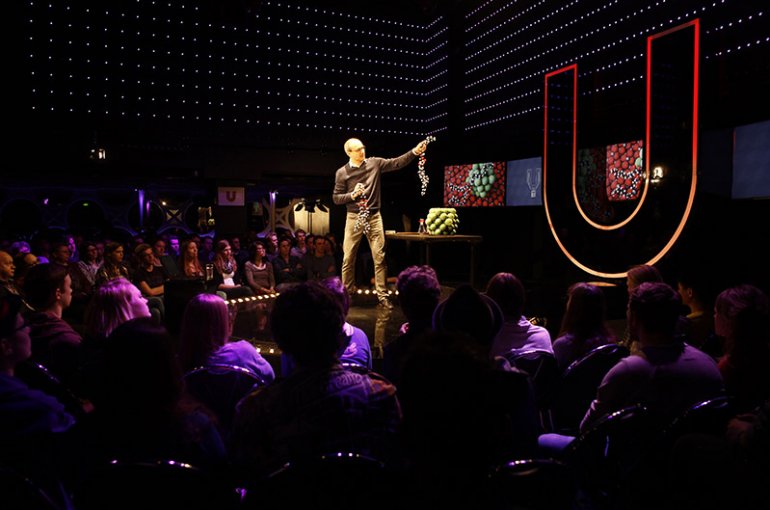Why shouldn’t you eat the tip of your ice cream cone?
Bert Weckhuysen at the Universiteit van Nederland

Why shouldn’t you eat the tip of your ice cream cone? Why is it so much harder to make petrol now than it was in the past, yet exhaust gases are becoming cleaner? And how can you make panty hose from tree bark?
Professor of Inorganic Chemistry and Catalysis Bert Weckhuysen answered all these questions and more at the Universiteit van Nederland. In five lectures, Weckhuysen explained all you need to know about catalysis, from fuels and plastics to saturated and unsaturated fats.
Why are exhaust gases becoming cleaner?
Monday, 9 May – Watch on the Universiteit van Nederland website (in Dutch)
Whether you are a boy racer or a Sunday driver, your car still emits lots of exhaust gases. Fortunately, the car is equipped with a catalytic converter, which makes those gases much less harmful for the environment. But how does that work, exactly?
Why is it becoming more difficult to make petrol?
Tuesday, 10 May – Watch on the Universiteit van Nederland website (in Dutch)
Crude oil was discovered in Titusville, Pennsylvania in 1859. At the time, people didn’t understand the full potential of this ‘black gold’. There’s just one problem: it is becoming increasingly difficult to make petrol from crude oil, so chemists are trying to find ingenious ways to press as many drops of clean fuel from every barrel of oil.
Why shouldn't you eat the tip of your ice cream cone?
Wednesday, 11 May – Watch on the Universiteit van Nederland website (in Dutch)
Are you one of the millions of people who look forward to eating the tip of your ice cream cone? If so, you probably don’t realise that the chocolate at the bottom isn’t very healthy. In this lecture, Bert Weckhuysen explains what’s going on with the chocolate in the tip, and what it has to do with catalysts.
How can you make plastic from potatoes, tree bark or sugar beets?
Thursday, 12 May – Watch on the Universiteit van Nederland website (in Dutch)
What do Lego, Tupperware, the hula hoop and nylon stockings all have in common? They are all plastics that can be made from crude oil. Bert Weckhuysen shows us how in this lecture, in which he also explains whether we could make all of our plastic from natural materials - and why it is a very bad idea to make all of our plastic biodegradable.
How can we waste less energy and raw materials?
Friday, 13 May – Watch on the Universiteit van Nederland website (in Dutch)
Yesterday’s concerns about acid rain have made way for concern about the greenhouse effect, so chemists have their work cut out for them finding a way for us to emit fewer harmful substances. But their goals are more far-reaching than that, such as finding ways to consume less energy and raw materials during chemical processes. This involves some real detective work to uncover what molecules get up to during these processes, and ideally to catch them in the act...
Sustainability at Utrecht University
Sustainability research at Utrecht University is exceptionally strong, spanning many different disciplinary fields, including the humanities, social sciences, and natural sciences. In 2017, Utrecht University launched Pathways to Sustainability, promoting interdisciplinary research within these academic disciplines and transdisciplinary approaches with external partners to take up an active role in furthering a more sustainable society. With rigor meets relevance as a guiding principle, Pathways to Sustainability pursues novel approaches in close interaction with governance, business and the scientific community.

